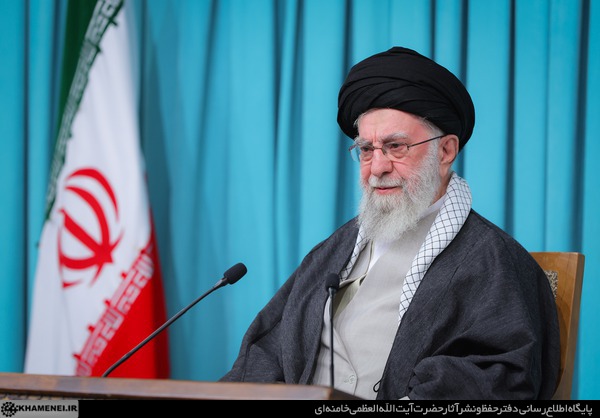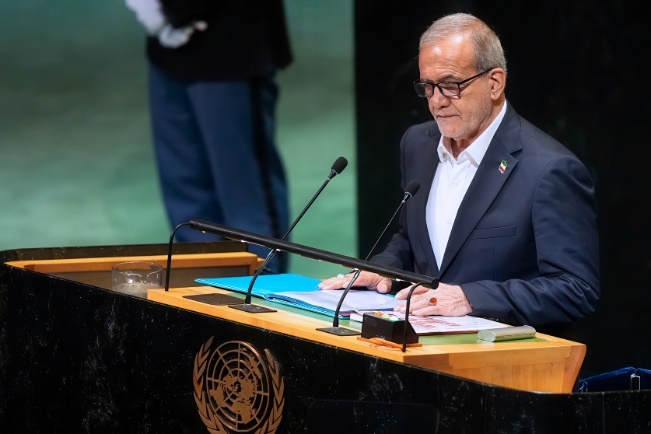 The Iranian President at the UN General Assembly (Iranian President’s website, September 24, 2025)
The Iranian President at the UN General Assembly (Iranian President’s website, September 24, 2025)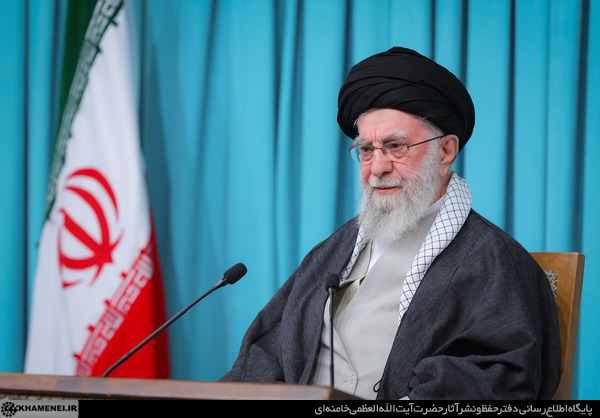 The Iranian Supreme Leader (Iranian Supreme Leader’s website, September 23, 2025)
The Iranian Supreme Leader (Iranian Supreme Leader’s website, September 23, 2025)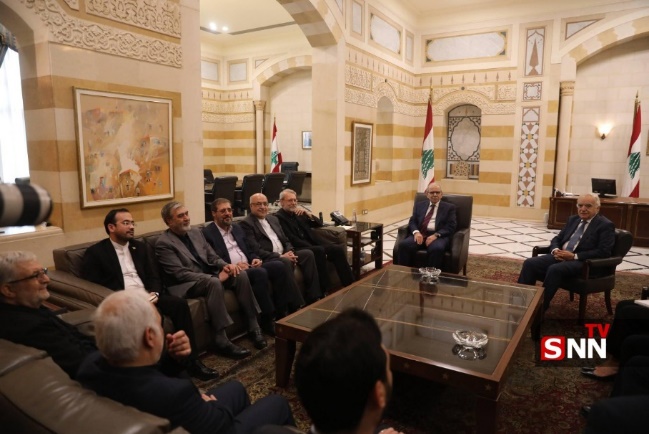 Larijani’s meeting with the Lebanese Prime Minister (snn.ir, September 27, 2025)
Larijani’s meeting with the Lebanese Prime Minister (snn.ir, September 27, 2025)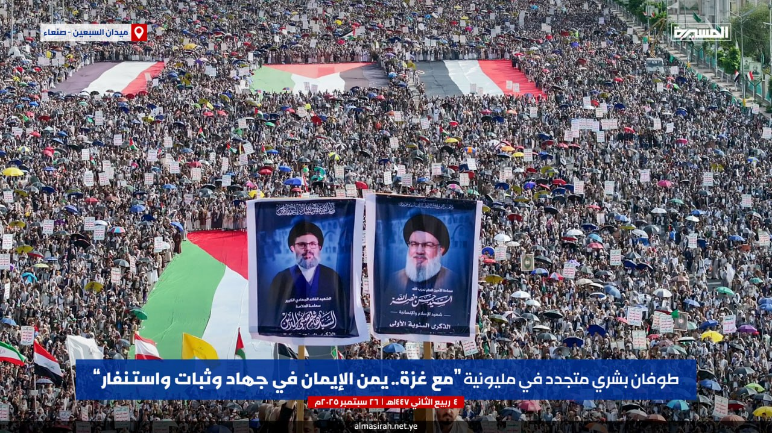 Pictures of Nasrallah and his designated successor, Hashem Safi al-Din, are carried in a “for Gaza” march in Sana’a (Al-Masirah TV, September 26, 2025)
Pictures of Nasrallah and his designated successor, Hashem Safi al-Din, are carried in a “for Gaza” march in Sana’a (Al-Masirah TV, September 26, 2025)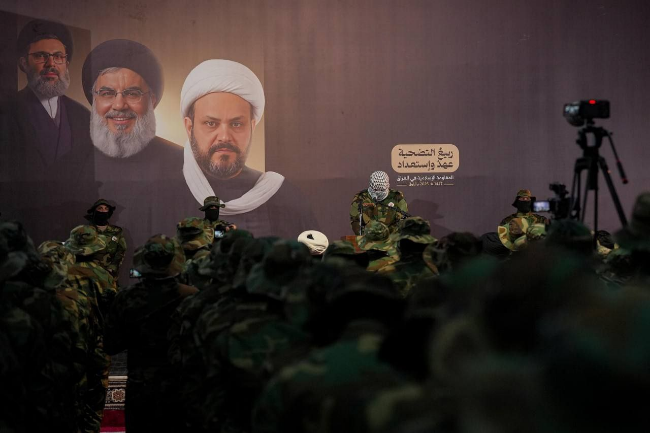 The ceremony of the Nujaba Movement to mark the first anniversary of Nasrallah’s killing (Telegram channel of the Nujaba Movement, September 27, 2025).
The ceremony of the Nujaba Movement to mark the first anniversary of Nasrallah’s killing (Telegram channel of the Nujaba Movement, September 27, 2025).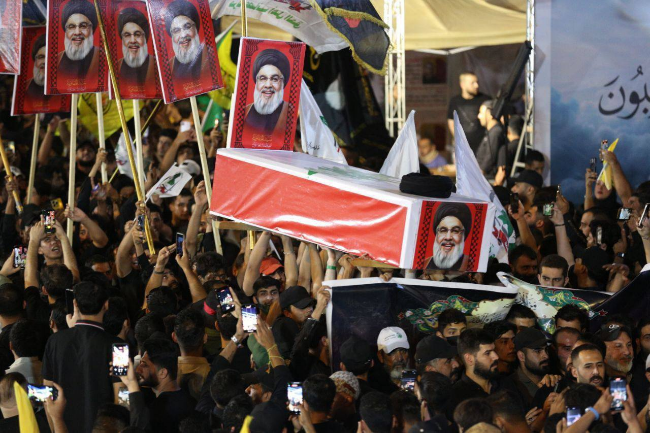 From the ceremony of the umbrella organization of the pro-Iranian militias in Baghdad to mark the first anniversary of Nasrallah’s killing (Sabrin News Telegram channel, September 26, 2025)
From the ceremony of the umbrella organization of the pro-Iranian militias in Baghdad to mark the first anniversary of Nasrallah’s killing (Sabrin News Telegram channel, September 26, 2025)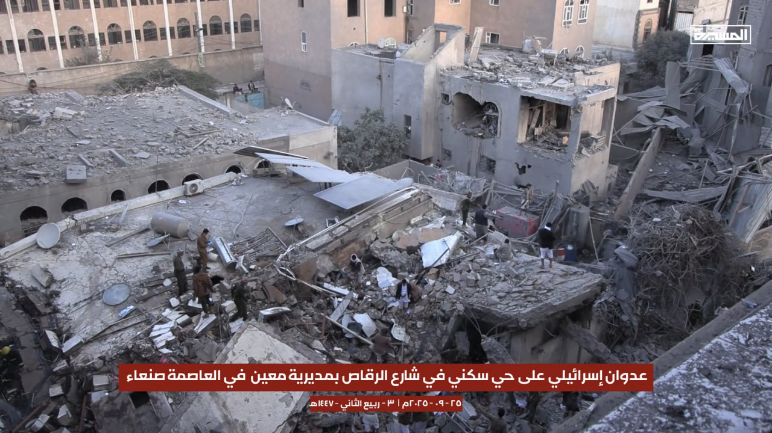 Damage from the airstrikes in Sana’a (Al-Masirah, September 25, 2025)
Damage from the airstrikes in Sana’a (Al-Masirah, September 25, 2025)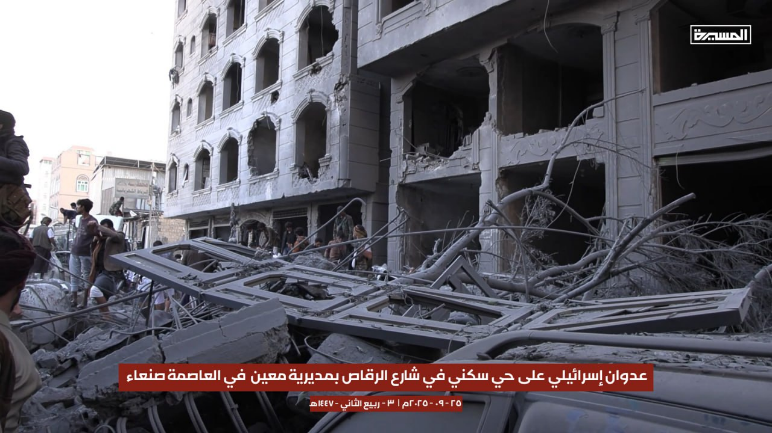 Damage from the airstrikes in Sana’a (Al-Masirah, September 25, 2025)Highlights[1]
Damage from the airstrikes in Sana’a (Al-Masirah, September 25, 2025)Highlights[1]
In his speech at the UN General Assembly, the Iranian President accused Israel of committing “genocide” in the Gaza Strip and declared that the “Greater Israel” plan expresses the true intentions of the “Zionist regime.” The Houthi leader in Yemen accused the Arab countries of making a “strategic mistake” due to their continued ties with Israel.
Hardline media in Iran expressed reservations about European countries’ recognition of the “State of Palestine,” arguing that such recognition is not enough to bring about a change in the Palestinians’ situation or to end the “Zionist occupation.”
Ali Larijani, Secretary of Iran’s Supreme National Security Council, arrived in Lebanon to participate in the commemoration ceremonies marking the first anniversary of the targeted killing of Hezbollah leader Hassan Nasrallah. He stressed Iran’s continued support for Hezbollah but made it clear that it does not interfere in Lebanon’s decision-making. Before Larijani’s visit, the Lebanese government refused to allow two Iranian planes to land in Beirut ahead of the anniversary events.
The Iranian Foreign Ministry spokesman responded to the Syrian President’s remarks that the severing of relations between the two countries is not permanent and said that Iran is ready to renew ties with Damascus but is not in a hurry to do so.
The Houthis claimed responsibility for nine attacks against targets in Israel using ballistic missiles and drones. Two drones exploded in Eilat, injuring at least 20 people. In response, the IDF attacked Houthi military targets in Sana’a.
The Houthis reportedly improved their own capabilities in the production of drones and long-range missiles and are preparing for the possibility of a ground raid into Israeli territory.
A Dutch-flagged cargo ship was attacked in the Red Sea and caught fire. Two crew members were injured.
The United States has added four pro-Iranian militias in Iraq to the list of Foreign Terrorist Organizations. The militias are preparing amid concerns about an Israeli attack.
A Syrian militia claimed responsibility for an explosion near an IDF post in southern Syria, in which an IDF reserve officer was seriously wounded.
Iran and the militias amid developments in the Palestinian arena
Iran
In his speech to the UN General Assembly, Iranian President Masoud Pezeshkian accused Israel of committing “genocide” in the Gaza Strip. He noted that today, after almost two years of “genocide, mass starvation, continued apartheid in the occupied territories, and aggression against neighbors,” the highest echelons of the “Zionist regime” are brazenly presenting the ridiculous and imagined plan of “Greater Israel” that includes large areas of the region. He noted that the plan reflects the true goals and intentions of the “Zionist regime” and that no one in the world is immune to its aggressive intentions. Pezeshkian added that the “Zionist regime” and its supporters are no longer content with normalization through political means, but are imposing their presence by force, calling it “peace by force.” However, this is neither peace nor strength but aggression based on bullying and coercion (Iranian President’s website, September 24, 2025).

The Iranian President at the UN General Assembly (Iranian President’s website, September 24, 2025)
Iranian Foreign Minister Abbas Araghchi, in his speech at the Global Development Initiative (GDI) discussion on the sidelines of the UN General Assembly in New York, referred to the situation in the Gaza Strip and said that the “ongoing genocide in Gaza” exposes the failure of the international community to uphold international law and prevent crimes against humanity. He noted that foreign occupation, aggression, and injustice could set back development achievements and undermine regional and global stability. He added that the deterioration of the situation in West Asia, especially the “crimes taking place in the Gaza Strip,” which threaten peace and development in the region and beyond, must not be ignored (Iranian Foreign Ministry website, September 24, 2025).
Hardline media in Iran expressed reservations about European countries’ recognition of the “State of Palestine,”[2] claiming that such recognition is not enough to bring about a change in the situation of the Palestinians:
According to an article in the newspaper Kayhan, some believe that now that almost nothing remains of the Gaza Strip, European governments, whose hands are stained with the blood of Gaza’s children, seek to save the “Zionist regime” from the pressure of world public opinion and to establish the rule of the “puppet government” headed by Mahmoud Abbas in a small area where Palestinian militant movements, such as Hamas and the Palestinian Islamic Jihad (PIJ), would no longer operate. It is argued that under these conditions, there will be no real change in the situation of the Palestinians. According to the daily, the idea of establishing a Palestinian state is one of the common tricks of the United States, the “Zionist regime,” and the West, which is intended to bring about recognition of Israel. This, it stresses, is while the entire land of “Palestine” belongs to the Palestinian people, and the “Zionists” must be expelled from it (Kayhan, September 22, 2022).
In an article in the newspaper Vatan Emrooz, it was claimed that the recognition of an independent Palestinian state did not stop the process of the “occupation” and even caused the “occupation” to expand many times over the past three decades. The daily noted that “the number of Zionists living in the West Bank” has increased from less than 100,000 in the 1990s to 600,000 today. In addition, the Palestinian Authority controls only 40% of Judea and Samaria, while the presence of the Israeli army and the Jewish settlers prevents full control over the people and the territory. In this reality, the recognition of “Palestine” as an independent state has become largely symbolic (Vatan Emrooz, September 22, 2025).
In his first response to President Trump’s plan to end the war in the Gaza Strip, Iranian Foreign Minister Abbas Araghchi said that Iran has always demanded an end to the “genocide” in the Gaza Strip and that it is the duty of all countries to help end the “crimes.” According to him, in the past eight years, there have been perhaps more than 100 plans to resolve the conflict in the Middle East, and only a plan that recognizes and respects the Palestinians’ right to determine their own destiny can last for a long time (CNN, September 30, 2025).
The Houthis
During the period under review, Abd al-Malik al-Houthi, the leader of the Houthi movement, delivered several speeches in which he criticized Muslim countries for their “silence” regarding events in the Gaza Strip and questioned the effectiveness of declarations recognizing a Palestinian state at the UN General Assembly. The main points were as follows (Al-Masirah, September 18, 21, 25, 27, 2025):
Criticism of Arab and Muslim countries: Al-Houthi asserted that the Israeli strike against Hamas leadership in Qatar constituted a “warning call” to the entire Muslim world that “the threats of the Israeli enemy” are not confined to the Palestinian arena. He charged that the conclusions of the Arab-Islamic summit in Doha, which failed to take practical measures against Israel, encouraged the “occupation” to continue its actions, and that Muslims had “abandoned the Palestinian people.” He accused Arab regimes of making a “strategic mistake” by continuing cooperation with the “Israeli enemy,” while showing “overt hostility” toward the fighters in the Gaza Strip. He said that only practical, serious measures against the “Israeli enemy” will protect the Islamic nation, and that Arabs have still not understood that, as a concrete step to defend the nation, they should boycott Israel and cease military cooperation with it.
Recognition of a Palestinian state: He claimed that the recognition of a Palestinian state by European countries is only a formal and media step that would have no real impact on preventing the continuation of the “enemy’s crimes.” He added that despite the recognition of Palestinian rights and “Israeli aggression,” what was heard during the UN General Assembly is not effective in stopping the “genocide” in the Gaza Strip, or in defending any other country in the Islamic nation. Al-Houthi claimed that the UN had done nothing for “Palestine,” even though it is a completely clear and well-known issue in the world.
Mahdi al-Mashat, the chairman of the Houthis’ Supreme Political Council (SPC), referred to the Arab-Islamic summit in Doha, saying they hoped its decisions would be practical instead of talk and condemnation. He appealed to the leaders of the Arab countries, stressing that the message of the “Zionist aggression” against Qatar was clear to everyone and that it meant that “your turn will come.” He once again threatened that the Houthi forces would “carry out the harshest blows against the criminal Zionist entity” (Al-Masirah, September 21, 2025).
Mohammed Ali al-Houthi, a member of the Houthis’ political bureau, stated that the two-state solution is a “betrayal of the Palestinian cause” and entails recognizing and conceding the “occupied lands” to the “Israeli terrorist entity.” According to him, this solution would neither restore Palestinian rights nor halt the “entity’s occupation” in the region and its efforts to expand it. He called on Saudi Arabia and the Arab and Islamic regimes not to turn the recognition of a Palestinian state into a cosmetic process and an umbrella for normalization with the “entity” (Mohammed Ali al-Houthi’s X account, September 22, 2025).
Abdallah Mohammed al-Naami, a member of the Houthis’ political bureau, voiced his opposition to Trump’s plan to end the war in the Gaza Strip, accusing it of being an “Israeli-Zionist plan” and a “document of humiliation and enslavement” for the Palestinians. He claimed that it was a plan of “submission and destruction” of the Palestinian cause, intended to serve as a basis for eliminating the leaders of the “resistance” and to provide legitimacy for the war in the Gaza Strip (Abdallah Mohammed al-Naami’s X account, September 29, 2025).
Iran and the militias amid developments in the Lebanese arena
Iran
In a speech marking “Sacred Defense Week” (commemorating the Iran-Iraq War), Iran’s Supreme Leader Ali Khamenei referred to the anniversary of the targeted killing of Hezbollah secretary-general Hassan Nasrallah.[3] He stated that Nasrallah had been a tremendous asset to the entire Islamic world, not only to the Shiites or to Lebanon. He stressed that this asset had not been lost but remained even after his death. Khamenei added that the story of Hezbollah in Lebanon is an ongoing one and that the organization should not be underestimated or ignored as an important asset for Lebanon, and not for Lebanon alone (Iranian Supreme Leader’s website, September 23, 2025).

The Iranian Supreme Leader (Iranian Supreme Leader’s website, September 23, 2025)
On September 27, 2025, Ali Larijani, Secretary of Iran’s Supreme National Security Council, arrived in Beirut to attend a memorial ceremony marking the death of Nasrallah. Upon his arrival in Beirut, he said that since his previous visits to Lebanon, many developments had taken place in the region and that it is now clear to everyone that the “Zionist regime” spares no country in the region, as evidenced by the recent strike in Qatar. He noted that the countries of the region are now seeking mechanisms for cooperation among themselves, and that this is the right approach, which Iran supports. Larijani added that Iran and Lebanon maintain historic friendly relations, which have grown stronger in recent years. He stressed that Iran has always supported the establishment of strong and independent governments, and he expressed hope that developments in the Lebanese arena would benefit the Lebanese people and provide a foundation for the establishment of a strong and independent government. Larijani further stated that the “resistance” was born from the Lebanese people, that it constitutes a source of pride for the entire Islamic world, and that it is a “resistance” outpost against Israel. During the visit, Larijani also met with Lebanese Prime Minister Nawaf Salam and Lebanese Parliament Speaker Nabih Berri (Tasnim, September 27, 2025).
At a press conference following his meeting with Berri, Larijani said that the “resistance” camp is a great asset for the Islamic world and that Hezbollah constitutes a strong outpost against Israel. Referring to reports of an initiative by Hezbollah to improve relations with Saudi Arabia, Larijani said that Hezbollah’s willingness, under the current circumstances, to set aside its disagreements with other countries and work to promote consensus demonstrates the height of wisdom and prudence. According to him, Iran views positively the possibility of cooperation between Saudi Arabia and Hezbollah against a common enemy. He stressed that Iran does not give instructions to anyone, and that Hezbollah secretary-general Naim Qassem is a prominent figure who decides for himself what serves the interests of his people. He added that Iran works to encourage Lebanese officials and the various political currents to act together in agreement and emphasized that Lebanon’s internal affairs are the concern of the Lebanese themselves. Larijani also addressed claims regarding Iranian assistance to Hezbollah, responding that Hezbollah is strong enough that it does not need weapons from other countries. In response to allegations by the US special envoy to Lebanon, Thomas Barrack, regarding financial aid amounting to millions of dollars from Iran to Hezbollah, Larijani scoffed, saying that it seemed to him that Barrack was angry (snn.ir, September 27, 2025).

Larijani’s meeting with the Lebanese Prime Minister (snn.ir, September 27, 2025)
During the visit, Larijani also met with Hezbollah secretary-general Naim Qassem. In a meeting attended by Iran’s ambassador to Beirut, Mojtaba Amani, Larijani stressed Iran’s support for Lebanon and the “resistance” in accordance with the instructions of Iran’s Supreme Leader Ali Khamenei. Qassem emphasized that Lebanon stands firm in the face of American-Israeli challenges and threats, saying that anyone who knows the courageous positions of the Lebanese people knows that they will win the struggle against the “Zionist enemy”. He said Hezbollah is ready for any kind of cooperation with anyone confronting the “Zionist regime,” which poses a danger to all peoples, countries, and the “resistance” (Al-Mayadeen, September 28, 2025).
Before Larijani arrived in Lebanon, it was reported that the Lebanese government had refused to allow two Iranian planes to land at Beirut International Airport ahead of the events marking the anniversary of Nasrallah’s targeted killing (Al-Jadeed, September 26, 2025).
The Islamic Revolutionary Guard Corps (IRGC) issued a statement on the anniversary of the deaths of Nasrallah and senior Hezbollah figures in the Israeli strike on Beirut. The statement said that the security and dignity of the Islamic nation are not the result of political compromises but of the sacrifices made by the “resistance” fighters on the battlefield, and that “active resistance” is the only logical option for the countries and peoples of the region in the face of imperialism and “global Zionism.” The IRGC emphasized that the increase in the “crimes” and the failed attacks of the “Zionist regime” testify to the strength of the “Axis of Resistance” and its immunity to defeat. “The resistance” is not an institution that can be dismantled through political or security processes, but an identity, an idea, and a culture rooted among the peoples of the region. According to the IRGC, the schemes of the “Zionists” and the Americans to weaken or destroy the “resistance” have failed many times, and this time will only bring humiliation and degradation to the enemies. Moreover, the “resistance” has not weakened but rather is strengthening and becoming a more prominent regional force. The statement said that the IRGC will continue its support of the “Axis of Resistance” and regards the path forward until the “elimination of the occupation and the liberation of Jerusalem” as a divine, national, and unstoppable mission (Tasnim, September 27, 2025).
The Houthis
In his weekly speech, Abd al-Malik al-Houthi, the leader of the Houthi movement, referred to the Lebanese government’s plans to disarm Hezbollah. He accused the Lebanese government’s positions as humiliating, subservient, and weak, saying that the government prioritizes Israel’s interests over Lebanon’s. Al-Houthi added that the government’s “stupid direction” toward Hezbollah will never protect Lebanon and will not defend its sovereignty (Al-Masirah, September 25, 2025).
In a speech marking the one-year anniversary of Nasrallah’s targeted killing, al-Houthi praised the former Hezbollah secretary-general’s role in defending Lebanon and in the fight against the “Israeli enemy.” He added that Hezbollah’s achievements under Nasrallah’s leadership were many, great, and important, and that the organization was not fighting alone, but as part of the solid “Axis of Resistance.” Al-Houthi stressed that the “Israeli aggression” in the region proves the necessity of jihad and “resistance,” since the only alternative is surrender (Al-Masirah, September 27, 2025).

Pictures of Nasrallah and his designated successor, Hashem Safi al-Din, are carried in a “for Gaza” march in Sana’a (Al-Masirah TV, September 26, 2025)
The militias in Iraq
The Nujaba Movement held a ceremony in Baghdad to mark the first anniversary of the killing of Nasrallah. In his speech, Akram al-Kaabi, the secretary-general of the militia, said that they are closely monitoring the alliances being formed in northern Iraq under Western and “Zionist” sponsorship, the activities of the “occupation” forces inside Iraq and their redeployment under the pretext of “troop withdrawal agreement,” as well as “the steps of the occupation in occupied Jerusalem.” In this context, he added that the “Islamic Resistance in Iraq” is vigilant, active, and independent. He warned that “with your crazy approach, you will probably soon experience what we warned you about, not only theoretically, but also as a tangible reality” (Telegram channel of the Nujaba Movement, September 27, 2025).


Right: The ceremony of the Nujaba Movement to mark the first anniversary of Nasrallah’s killing (Telegram channel of the Nujaba Movement, September 27, 2025). Left: From the ceremony of the umbrella organization of the pro-Iranian militias in Baghdad to mark the first anniversary of Nasrallah’s killing (Sabrin News Telegram channel, September 26, 2025)
Iran and the Syrian arena
Iranian Foreign Ministry spokesman Esmail Baghaei, at his weekly press conference, referred to the remarks of Syrian President Ahmad al-Shara, who said that the severing of relations between his country and Iran is not permanent. Baghaei noted that Iran, too, believes that the severing of relations between two Muslim countries with a history of friendship cannot be permanent. He added that Iran believes Syria’s fate should be determined by the Syrian people, while taking into account the rights of all the sects and groups that make up Syrian society. According to him, Iran has strongly condemned the attacks of the “Zionist regime” against Syria and supports preserving Syria’s territorial integrity and unity. Baghaei stressed that Iran considers itself a friend of the Syrian people but is not rushing to renew relations between the two states. He said that once Syria decides that friendship with Iran serves the interests of its people, Tehran will be ready for it on a reciprocal basis (Iranian Foreign Ministry website, September 17, 2025).
The Houthis in Yemen
The direct confrontation between the Houthis and Israel
During the period in review, the Houthis’ military spokesman, Yahya Saria, claimed responsibility for nine attacks against targets in Israel. Three of the attacks were carried out by ballistic missiles, including two with a cluster warhead, and six by drones. It was claimed that all the attacks achieved their objectives (Yahya Seria’s Telegram channel, September 17-30, 2025). On September 18, 2025, a drone exploded in Eilat, causing a fire, but there were no casualties. On September 24, 2025, a drone exploded in a tourist center in Eilat after interception attempts failed, and at least 20 people were wounded, two of them seriously. In addition, the IDF Spokesperson reported the interception of six drones and three missiles launched from Yemen. At least one rocket fell before reaching Israel (IDF Spokesperson and the Israeli media, September 17-30, 2025).
On September 25, 2025, Israeli Air Force fighter jets attacked Houthi military targets in Sana’a. According to the IDF, targets of the Houthis’ security and intelligence apparatus were attacked, including a command headquarters, military compounds and camps, the headquarters of the Military Information Department, and weapons depots (IDF Spokesperson, September 25, 2025).
Houthi military spokesman Yahya Saria claimed that the Houthi air defense systems had fired several surface-to-air missiles at the planes, forcing some of them to withdraw before carrying out their attacks (Yahya Saria’s Telegram channel, September 26, 2025). A “military source in the Houthis’ Ministry of Defense” denied that an attack had been carried out against the command-and-control headquarters (Saba News Agency, September 25, 2025). The Houthis’ security and intelligence forces reported that the “Zionist enemy” had attacked several neighborhoods in Sana’a, as well as security sites belonging to the apparatuses, claiming that the attack on the prison facilities and its surroundings “was intended to allow the prisoners to escape” (Al-Masirah, September 25, 2025). According to the Houthi Ministry of Health, a total of 11 people were killed and 205 others were wounded in the airstrikes (Saba News Agency, September 27, 2025).


Damage from the airstrikes in Sana’a (Al-Masirah, September 25, 2025)
Abd al-Malik al-Houthi, the leader of the Houthi movement, said that the attack that hit Eilat on September 24, 2025, was “of great importance because it penetrated the defense system of the Israeli enemy” (Al-Masirah, September 25, 2025). Referring to the Israeli attack in Sana’a, al-Houthi said it would not affect the Houthis’ position regarding support for the Palestinians and the struggle against the “Israeli enemy” (Al-Masirah, September 27, 2025).
Hezam al-Asad, a member of the Houthis’ political bureau, issued several statements in Hebrew following the attacks in Eilat. The statements read: “Eilat ‘Umm al-Rashrash’ is not safe, and all the occupied lands will never be safe”; “Whoever has not been educated by time will be taught by Yemen. You will deeply regret every drop of blood of a child from Gaza… And vengeance will not be long in coming”; “While the Jews celebrate the murder of their forefathers, the prophets and the righteous, like Gedaliah, and their expulsion from Canaan, ‘Palestine’ according to their claims, Yemen’s drones today are writing a new turning point towards the elimination of the temporary entity… A new year full of supersonic missiles and blessed aircraft!” (Hezam al-Asad’s X account, September 24-25, 2025).
Against the backdrop of the Houthi strikes and the hits in Eilat, it was reported that the Israeli security establishment identified “significant progress” in the Houthis’ capabilities for indigenous production of drones and long-range missiles, and in using underground facilities to manufacture and store them. In addition, it was reported that Israel is monitoring Houthi planning and training to carry out a ground attack against Israel from one of its neighboring countries.[4] The reports claimed that these actions are being carried out according to the Iranian model of the “Axis of Resistance” members basing themselves on protected, indigenous production of heavy, precision missiles and drones to avoid dependence on external supply, particularly from Iran (Israeli media, September 26, 2025).
On September 17, 2025, the Houthis’ Foreign Ministry sent a letter to UN member states and other members of the organization in response to the Israeli attack on the port of Hodeidah the day before, accusing Israel of targeting civilians and civilian targets since July 2025. It was also said that the “entity” was targeting the ports of Hodeidah, Ras Issa, and Al-Salif to “exacerbate the humanitarian suffering of the Yemeni people.” The Houthi Foreign Ministry stressed that Israel’s actions would not deter Yemen from its supportive position toward the Gaza Strip and would only lead it to increase the pace of its military activities in support of the Strip (Saba, September 17, 2025).
Pakistani Interior Minister Mohsin Naqvi claimed that on September 17, 2025, a liquefied petroleum gas (LPG) tanker with 27 crew members, including 24 Pakistani citizens, was attacked by an Israeli drone at the port of Ras Issa. Naqvi said that one of the tanks exploded and that the crew managed to extinguish the fire. He further claimed that the ship was subsequently seized by the Houthis and the crew members were held hostage on board. Naqvi noted that following joint efforts by Pakistan, Oman, and Saudi Arabia, the ship and its crew were released and left Yemen’s territorial waters (Mohsin Naqvi’s X account, September 27, 2025). According to another report, the tanker is under US sanctions and was carrying Iranian oil (Yemen Monitor, September 27, 2025).
In this context, Bassim al-Janani, an anti-Houthi journalist, reported that the port of Ras Issa had been the target of ongoing drone attacks against the port’s oil unloading facilities, killing and injuring several facility workers. Al-Janani claimed that the Houthis hid the details of the attack, collected the remains of the drones, and photographed the damage (Bassim al-Janani’s X account, September 28, 2025).
Houthi attacks on vessels
On September 29, 2025, the UK Maritime Trade Operations (UKMTO) reported that an explosion had occurred near a vessel sailing in the Red Sea, about 230 km southeast of the port of Aden, Yemen, and that the ship was on fire (UKMTO X account, September 29, 2025). The European Union Naval Force (EUNAVFOR Aspides) confirmed that the Dutch-flagged cargo ship MV MINERVAGRACHT had been attacked, caught fire, and was left adrift at sea. All 19 crew members were rescued by Greek and French frigates; two of them were wounded, one seriously, and evacuated to a hospital in Djibouti (EUNAVFOR Aspides X account, September 30, 2025). The Houthis’ military spokesman, Yahya Saria, has not yet claimed official responsibility for the attack, but an account affiliated with the Houthis wrote: “Thanks to God and to our armed forces personnel, the Zionist ship is on fire” (“Yemeni Armed Forces Sana’a” Telegram channel, September 29, 2025).
The pro-Iranian militias in Iraq
Preparations for possible action against the militias
On September 17, 2025, the US Department of State announced that it had designated four Iran-aligned Iraqi militias – Harakat al-Nujaba (HAN), Kata’ib Sayyid al-Shuhada (KSS), Harakat Ansar Allah al-Awfiya (HAAA), and Kata’ib al-Imam Ali (KIA) – as Foreign Terrorist Organizations (FTOs). The statement said that Iran continues to provide support enabling these militias to plan and carry out attacks across Iraq, and that the designation is part of the “maximum pressure” campaign on Iran. It added that the US would continue to employ all means to protect its security interests and prevent funding and resources from reaching terrorist entities (US Department of State website, September 17, 2025).
In response, it was reported that the four militias held an emergency meeting to discuss ways to deal with “American pressures and warnings of an imminent Israeli attack against headquarters in Iraqi territory.” “Sources in the pro-Iranian militias” said that the militia representatives discussed scenarios for responding to any possible attack, while expressing their willingness to continue jihad activity, especially in light of the ongoing war in the Gaza Strip and Lebanon. However, the sources noted that the official handling of the issue remains in the hands of the government (Al-Akhbar, September 22, 2025).
“Three senior Iraqi officials” said that the US administration has been exerting pressure on Iraq for several weeks to promote disengagement from Iran. According to the “senior officials,” these measures do not directly relate to the issue of the militias and include reforms in the judicial system and in the economic field. It was noted that among the political elements in the pro-Iranian militias in Iraq, there is a suspicion that the American steps will give Israel a green light to strike targets inside Iraq (Al-Araby Al-Jadeed, September 24, 2025). In this context, Iraqi President Abdul Latif Rashid said that the pro-Iranian militias have “good relations” with Iran. However, he stated that “this is not a major issue in Iraq at the moment.” He emphasized that the militias seek to maintain their independence and make their own decisions as Iraqi organizations rather than come under the influence of external actors (Fox News, September 28, 2025).
Against the backdrop of Prime Minister Netanyahu’s threats in his speech to the UN General Assembly that Israel might eliminate the leaders of the pro-Iranian militias in Iraq if they attacked Israel, Faleh al-Fayyad, chairman of the Popular Mobilization Forces (the umbrella framework of the pro-Iranian Shiite militias), said that they have all the means to respond to any “aggression,” they are not deterred by threats of force, and are committed. According to him, Netanyahu “crossed all the red lines” (Popular Mobilization Forces Telegram channel, September 27, 2025). Hussein al-Moussawi, spokesman for the Nujaba Movement, said that Netanyahu’s speech exposed “his internal dilemma and his escape from the reality of defeat in Gaza.” According to him, the Iraqi resistance has many possibilities and will not allow the “occupation” to threaten Iraq’s security and sovereignty. He also claimed that “the Zionist regime understands that any new adventure will have severe consequences” (Al-Akhbar, September 29, 2025).
Subsequently, “sources close to the militias” admitted that there are disagreements regarding the issue of activity against Israel and standing with Iran. According to the sources, most of the militias are not interested in fighting that could lead to the destruction of their structure and the targeted killing of leaders, and they have understood that their intervention will not change the balance of power, and they may be exposed to destructive attacks by Israel. According to them, the militias have recently begun to take precautionary measures to avoid an Israeli attack, including changing the location of their main headquarters and senior commanders and refraining from carrying personal electronic devices and mobile phones (Asharq Al-Awsat, September 28, 2025).
In this context, “sources close to the militias” admitted that there are disagreements regarding the issue of activity against Israel and aligning themselves with Iran. According to the “sources,” most of the militias are not interested in entering into fighting that could lead to the destruction of their structures and the elimination of their leaders, and they have realized that their intervention would not change the balance of power and that they could be exposed to devastating Israeli strikes. They added that in recent weeks, the militias have begun to take precautionary measures to avoid Israeli attacks, including relocating their main headquarters and senior commanders, and refraining from carrying personal electronic devices and mobile phones (Asharq Al-Awsat, September 28, 2025).
Liberation of Elizabeth Tsurkov
Kata’ib Hezbollah spokesman Abu Ali al-Askari referred to the release of Israeli-Russian researcher Elizabeth Tsurkov on September 9, 2025, after about two and a half years in captivity. He claimed that, according to the information they possess, she, her handler “Eitan Naama,” and a team of agents in Iraq had been operating along three tracks. He further claimed that Tsurkov was the link between the “Zionist” security services and Hay’at Tahrir al-Sham (HTS) and its leader, Abu Mohammad al-Julani (the current president of Syria, Ahmad al-Shara), and that she was part of a broader plan established in 2018 to promote al-Julani and bring him to power in Damascus. He added that those responsible for the abduction “emptied her of all the information she possessed and dismantled her team, rendering her devoid of security value.” According to al-Askari, they understood that one of the reasons the al-Sudani government acted to release Tsurkov was to spare Iraq a potential attack and to compel the “American enemy” to comply with the agreement reached with the government regarding the withdrawal of forces (Abu Ali al-Askari’s Telegram channel, September 23, 2025).
The militias in Syria
On September 29, 2025, an IDF reserve officer was seriously injured after being hit by an explosion near an IDF post in southern Syria, apparently after stepping on an old mine (IDF Spokesperson and the Israeli media, September 29, 2025). The “National Resistance in Syria” claimed that its operatives were responsible for the explosion near an IDF post, which it said was the organization’s first military operation. The statement claimed that they had monitored the movements of the “occupation forces” before planting an explosive device at the entrance to the military post in the rural area of Quneitra. The organization called on the “interim administration” in Damascus not to pursue the “resistance fighters” in Daraa and Quneitra, because this would have consequences “that the resistance does not want and does not prepare for” (Al-Mayadeen, September 29, 2025).
[1] The weekly study includes the activities of Iran, the Shiite militias in Iraq, and the Houthis in Yemen. ↑
2] For further information, see the ITIC’s study from September 29, 2025, “Reactions to the Wave of Recognition of a Palestinian State” ↑
[3] For further information, see the ITIC’s study from September 29, 2025, “The Anniversary of Nasrallah’s Death and the Challenges facing Hezbollah” ↑
[4] For further information, see the ITIC’s study from September 13, 2024, “The Houthis in Yemen threaten Israel with ground attacks” ↑
Related Articles

